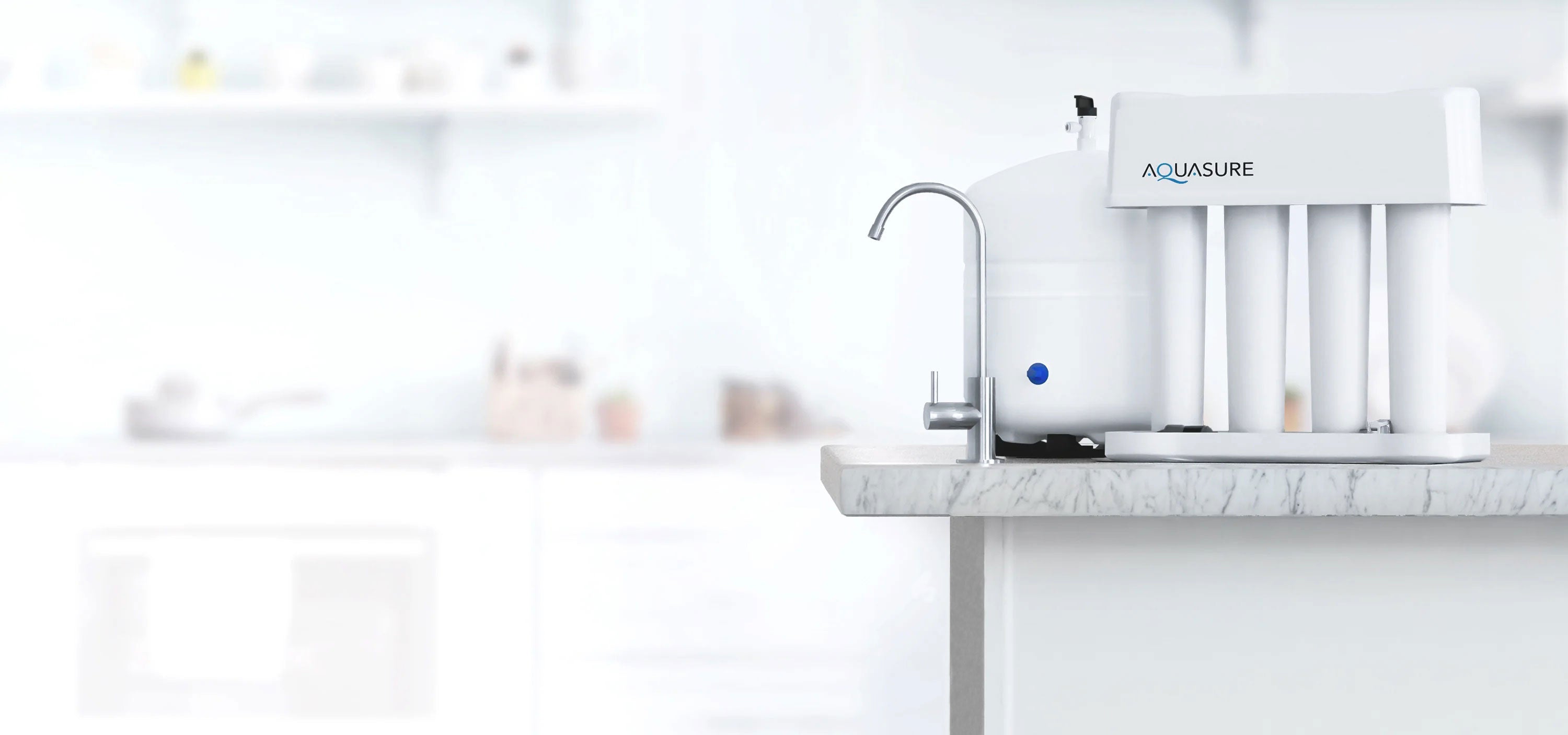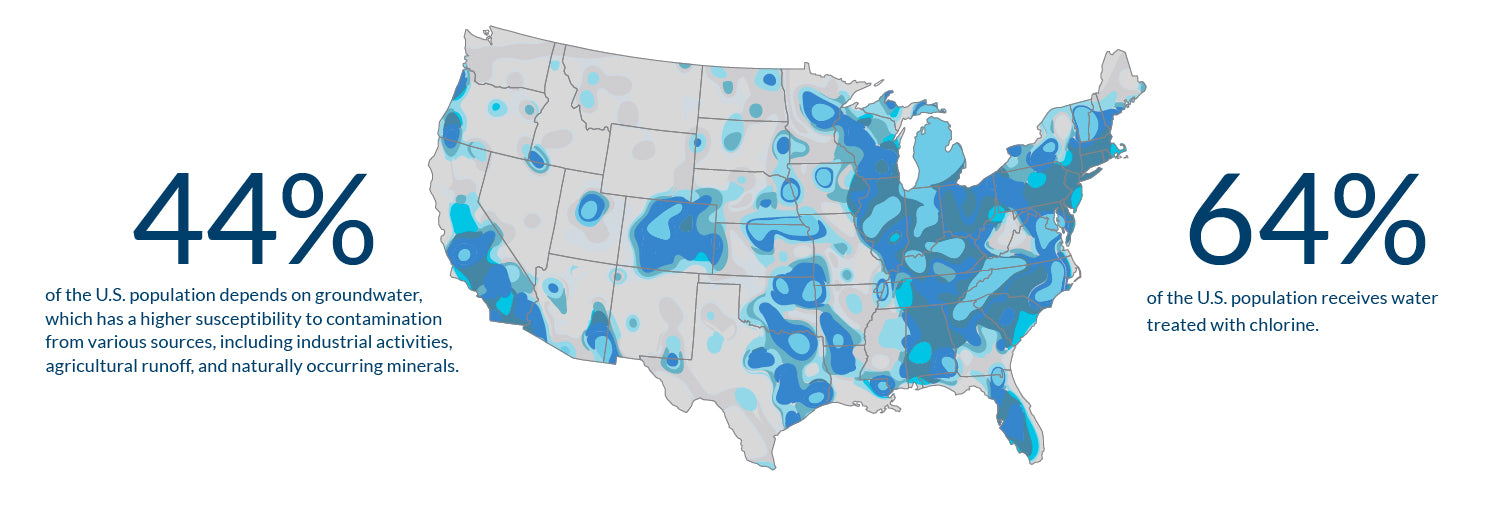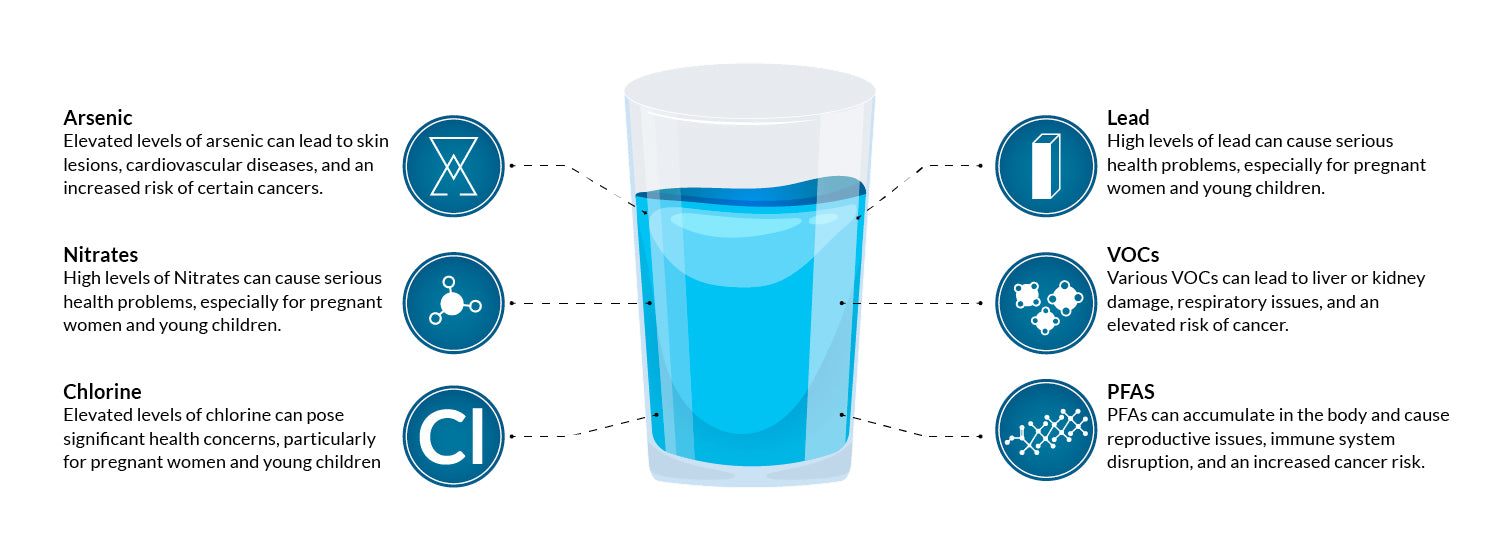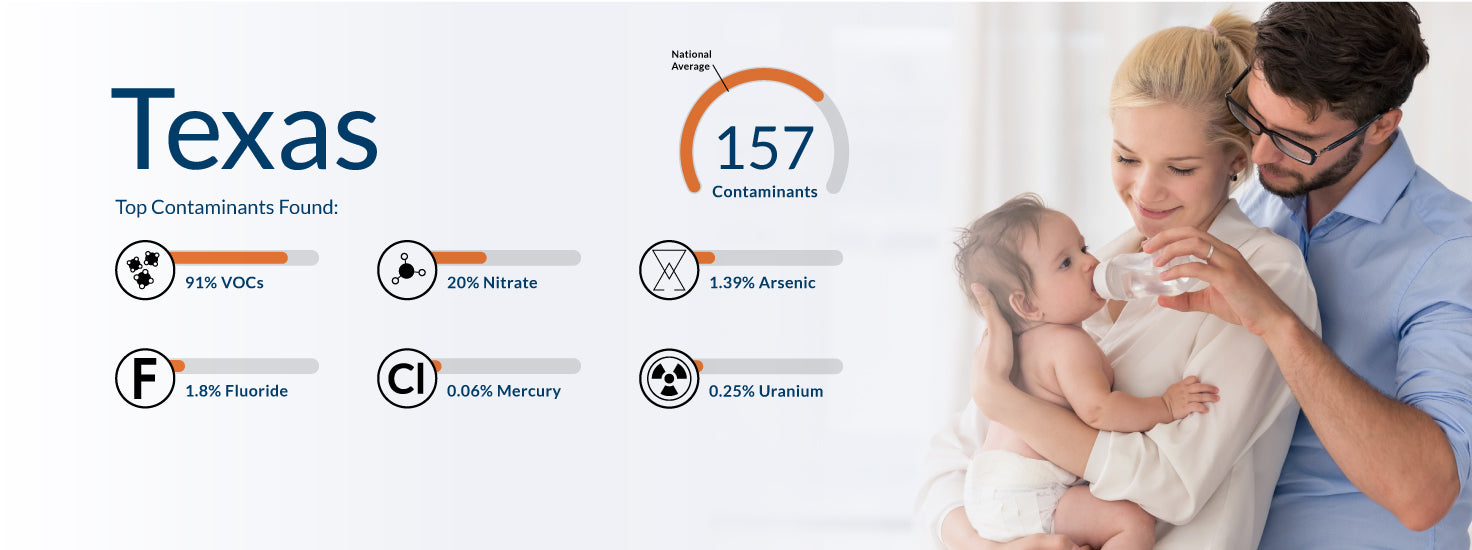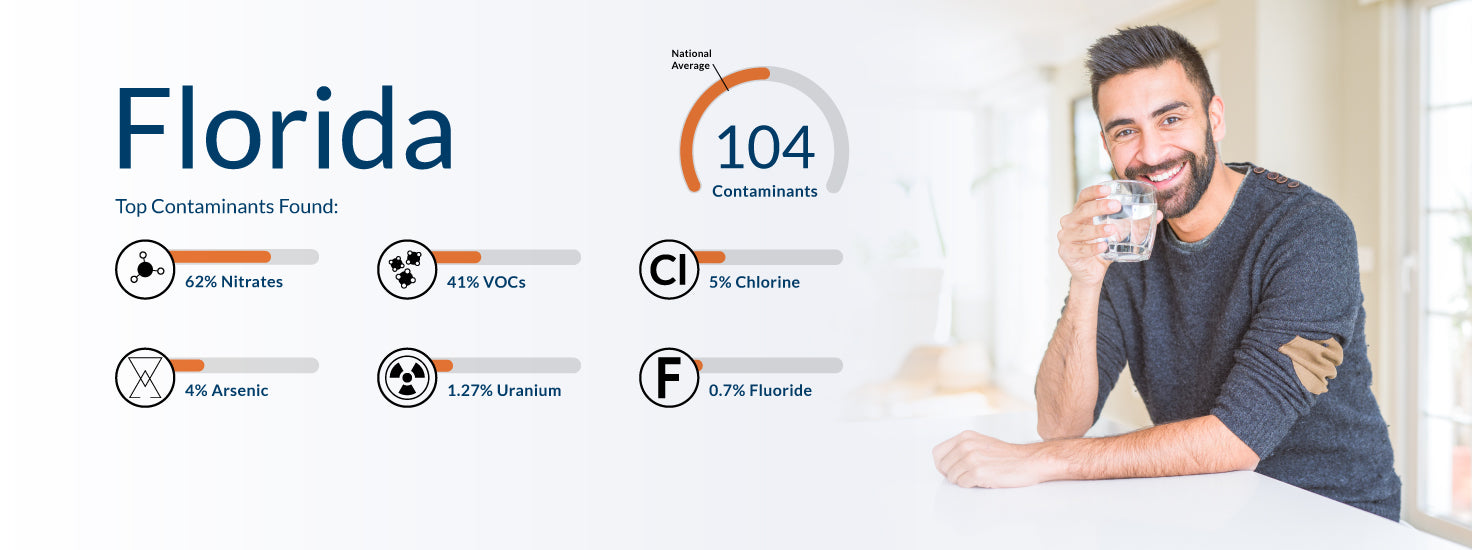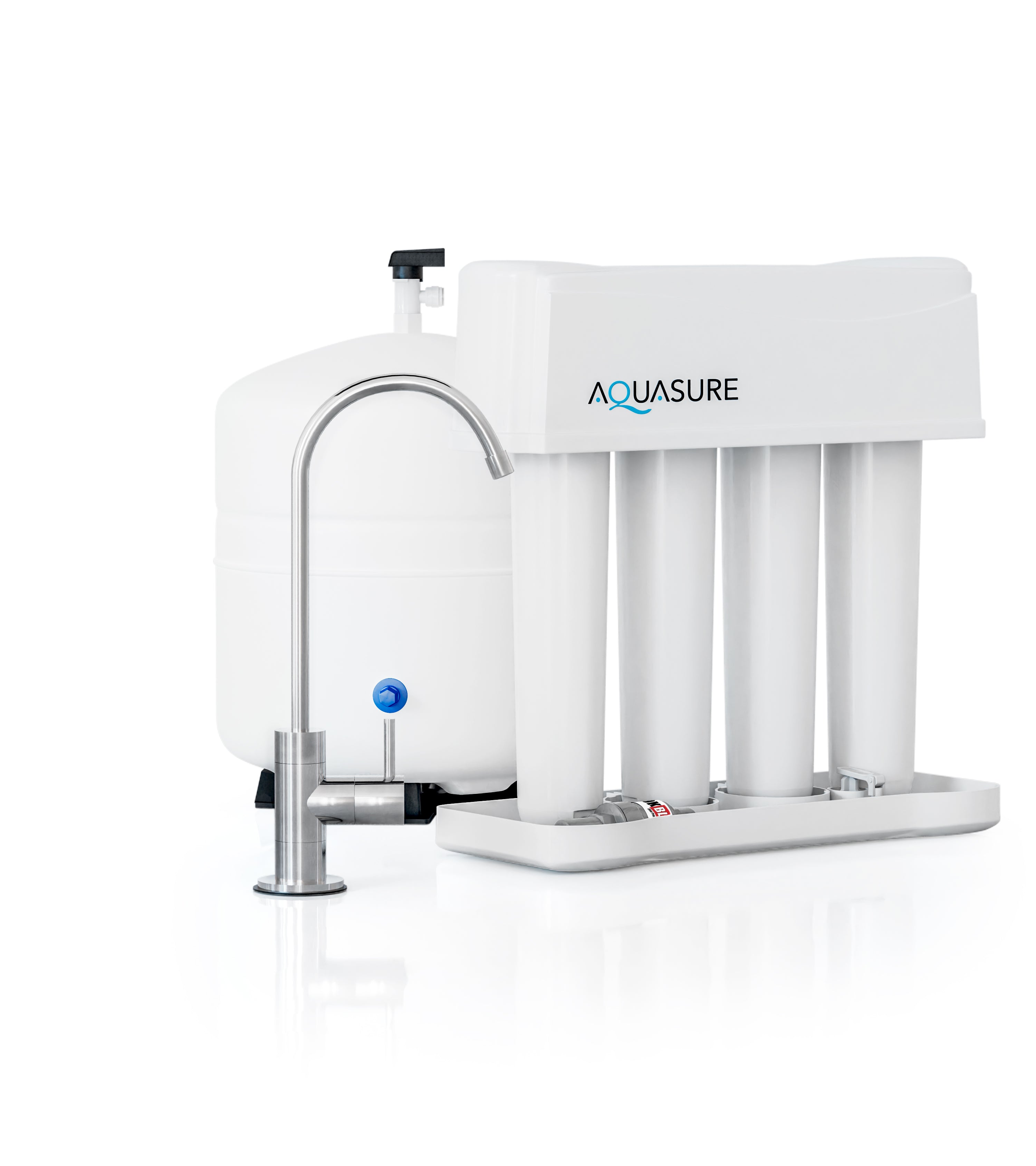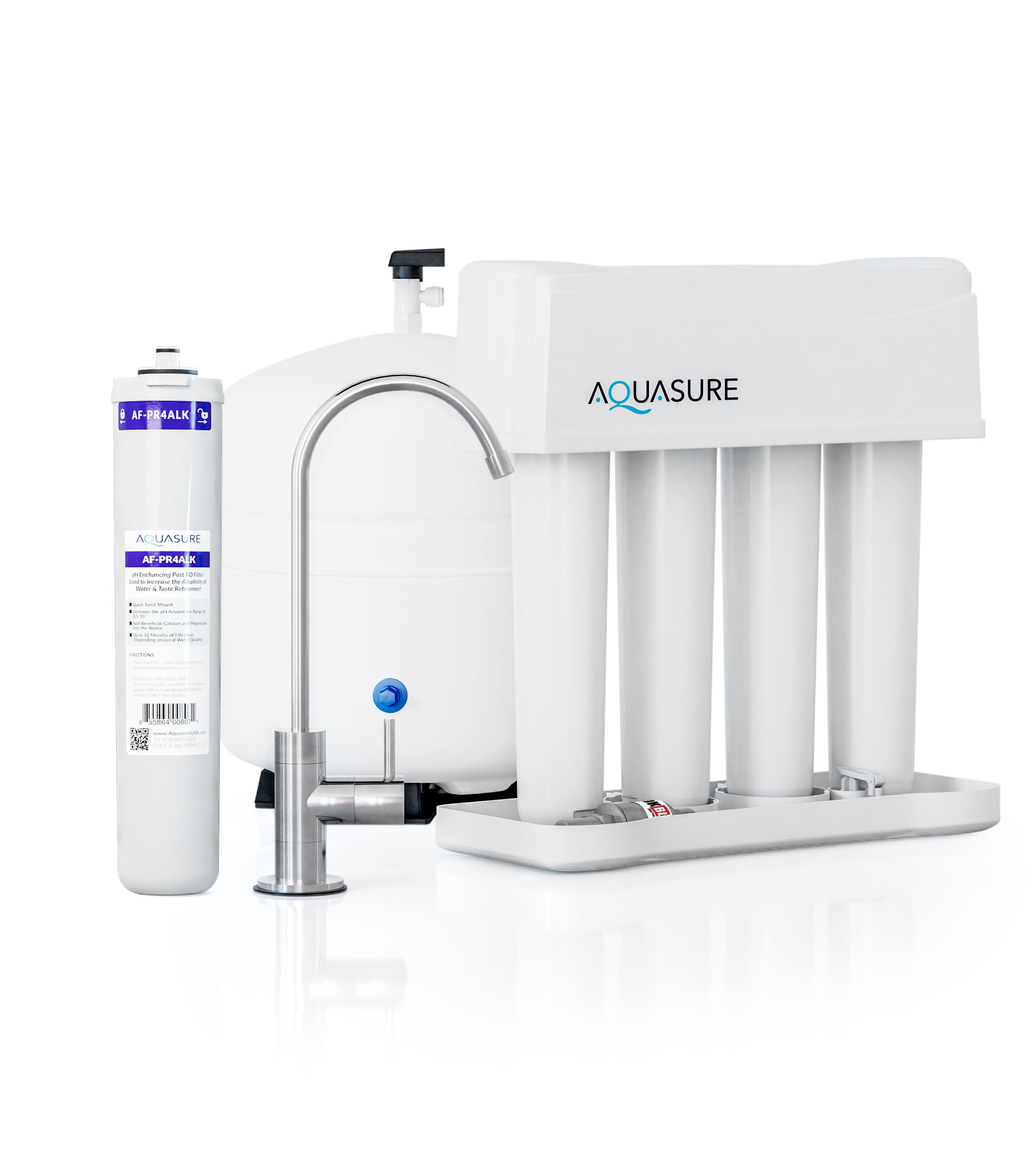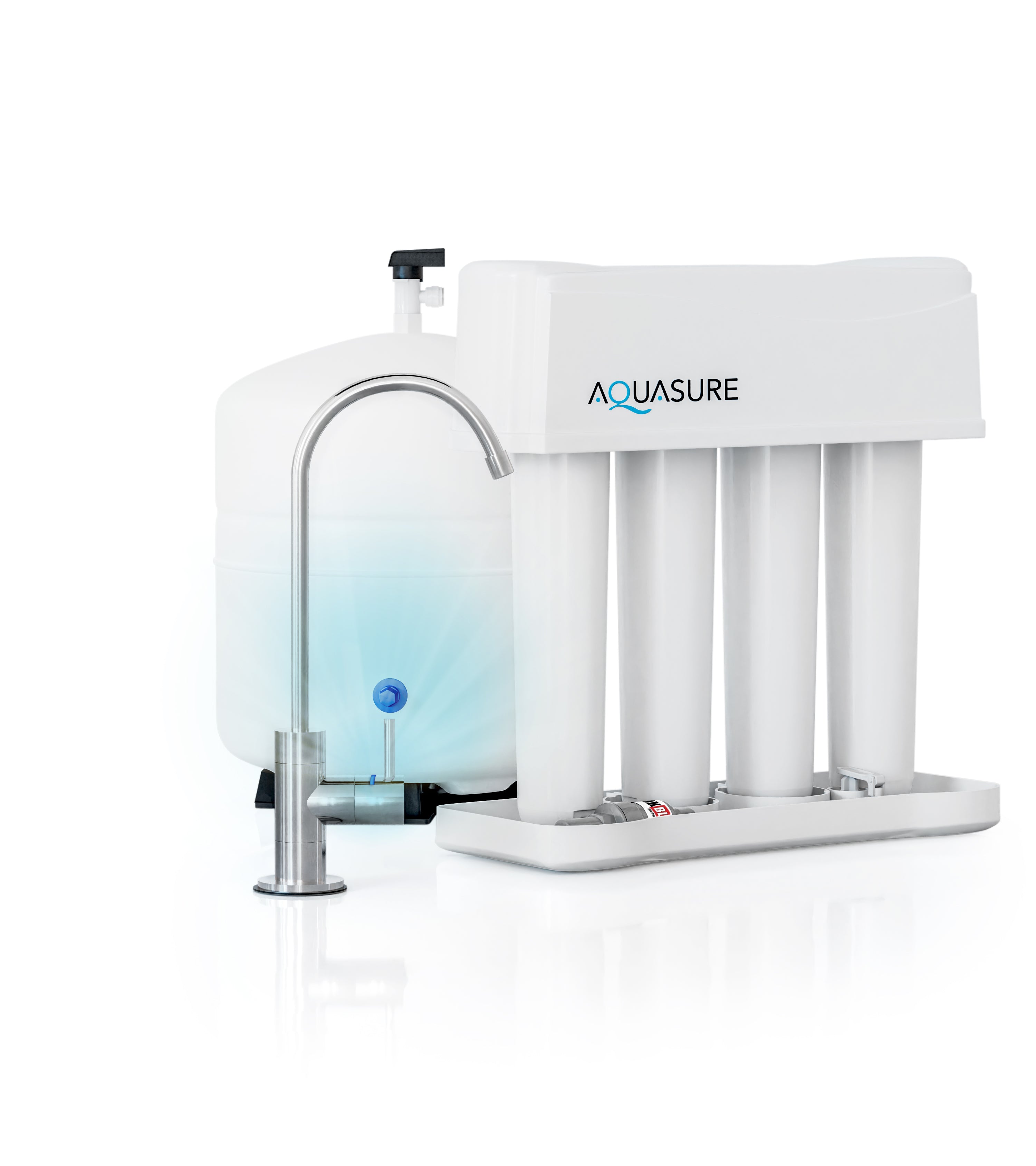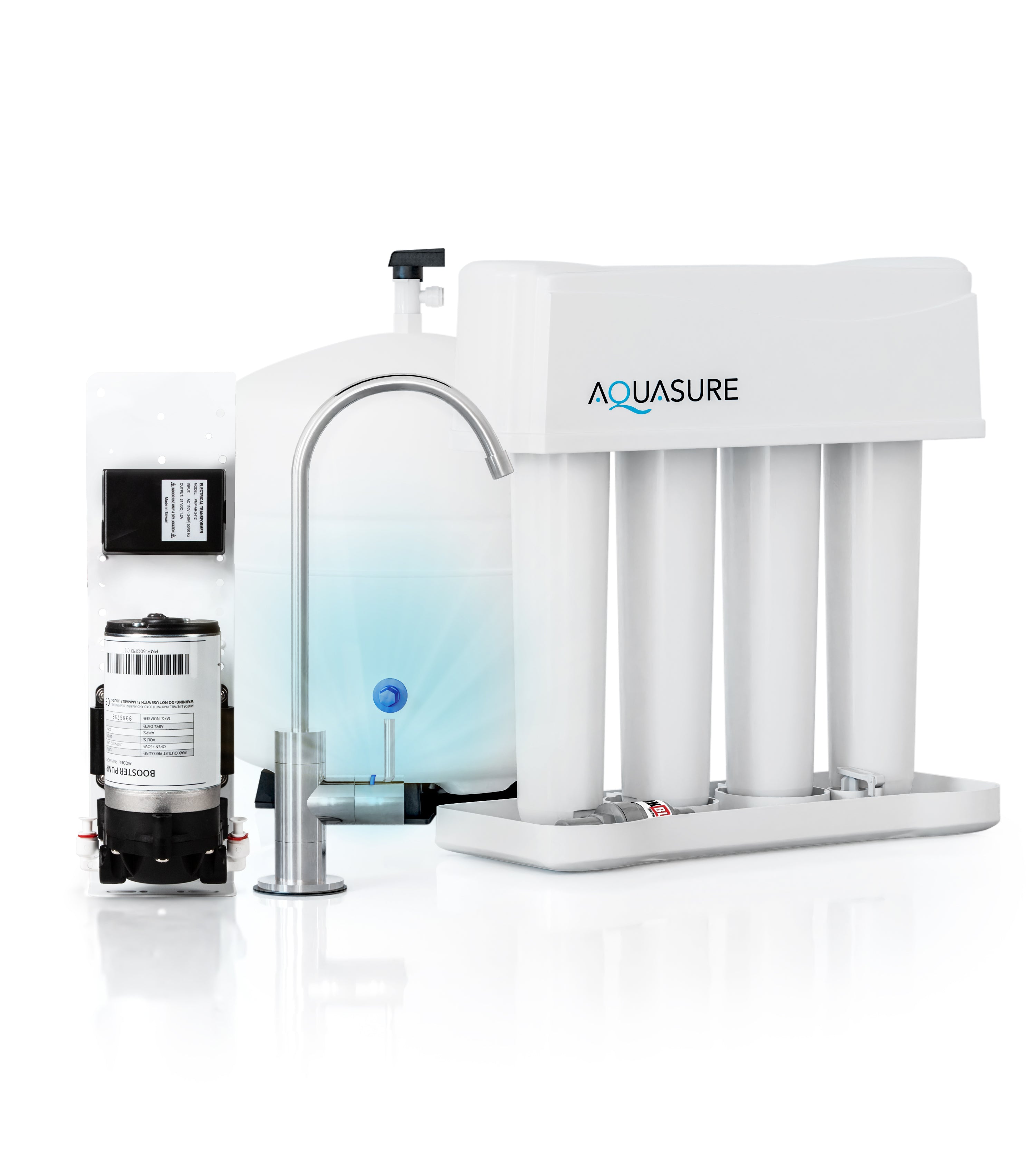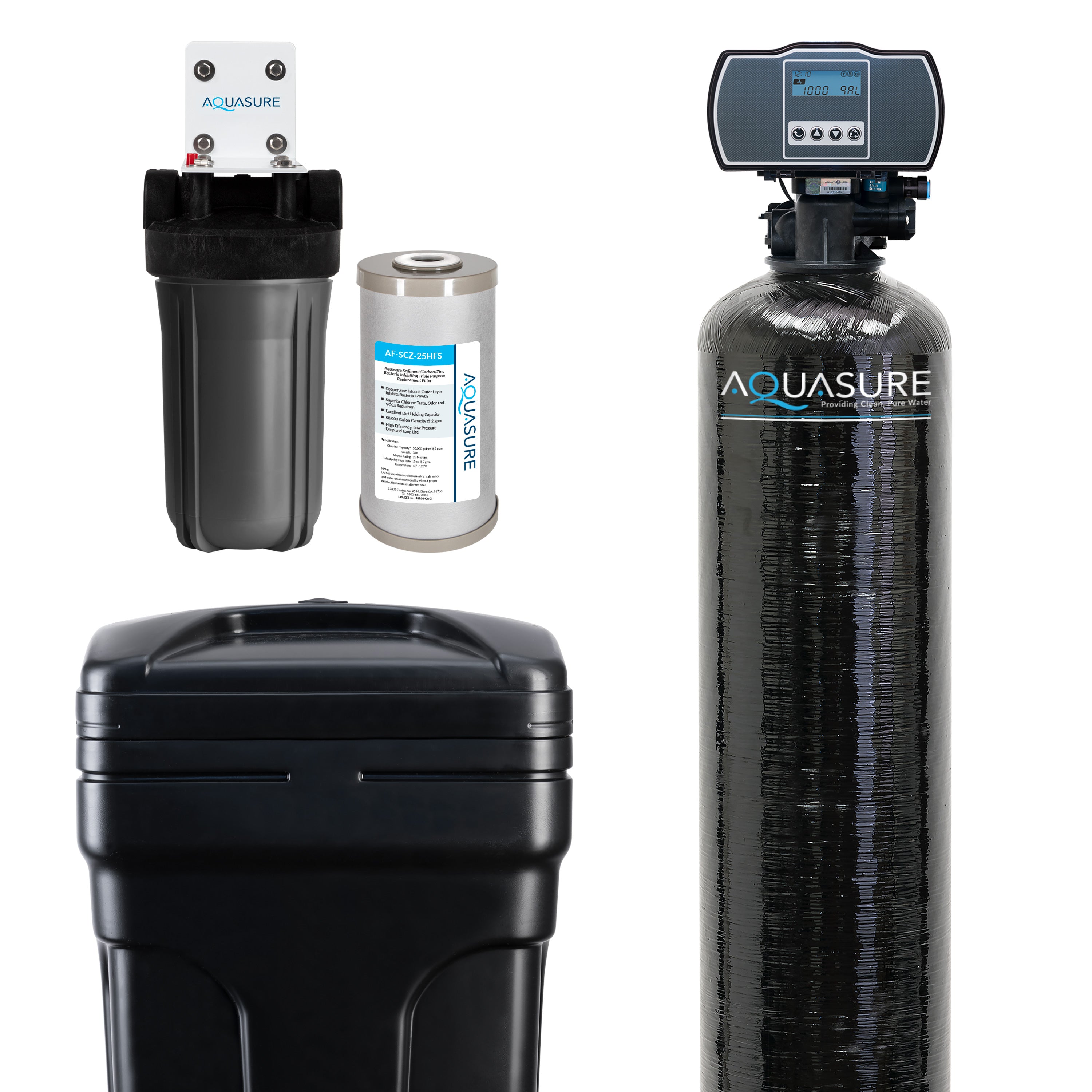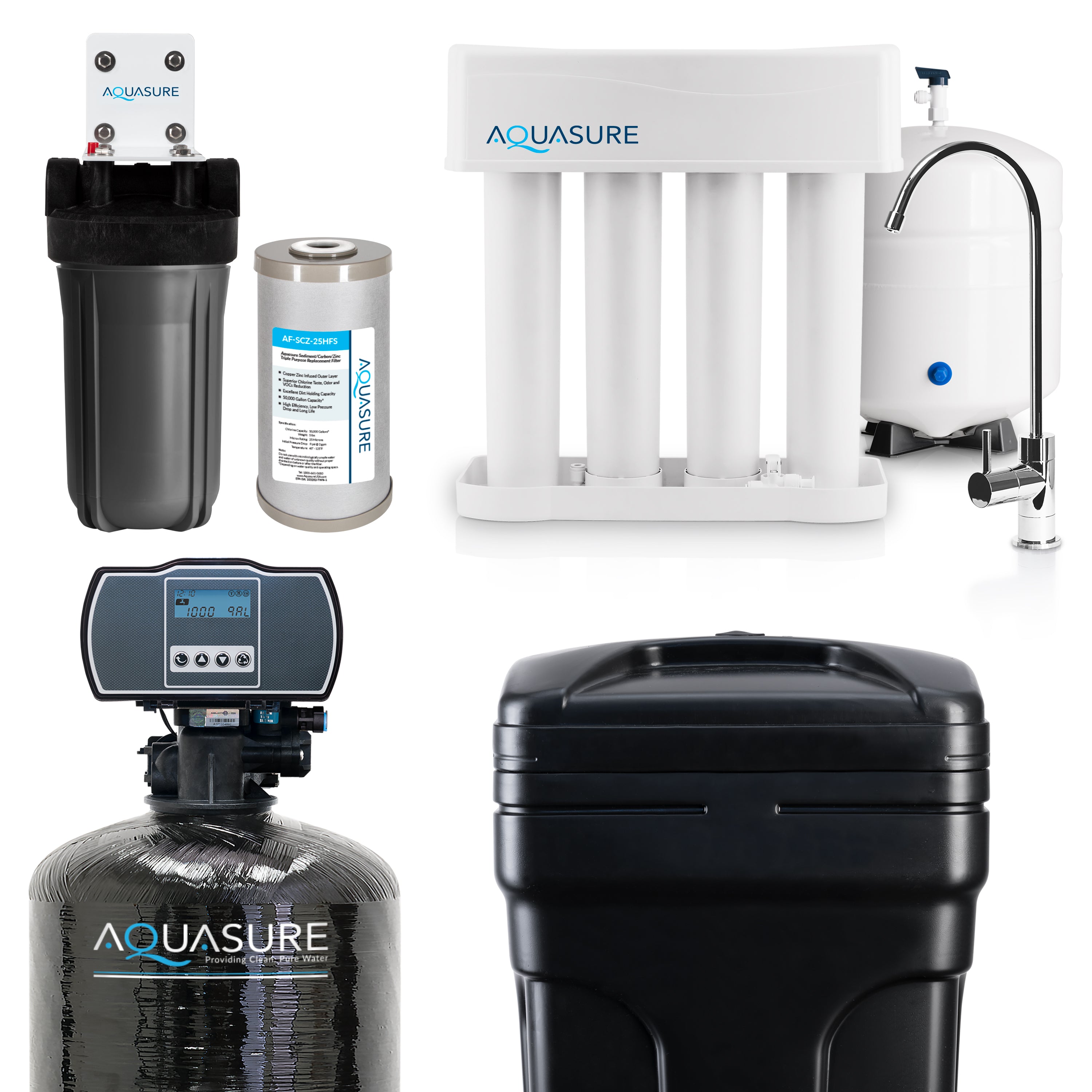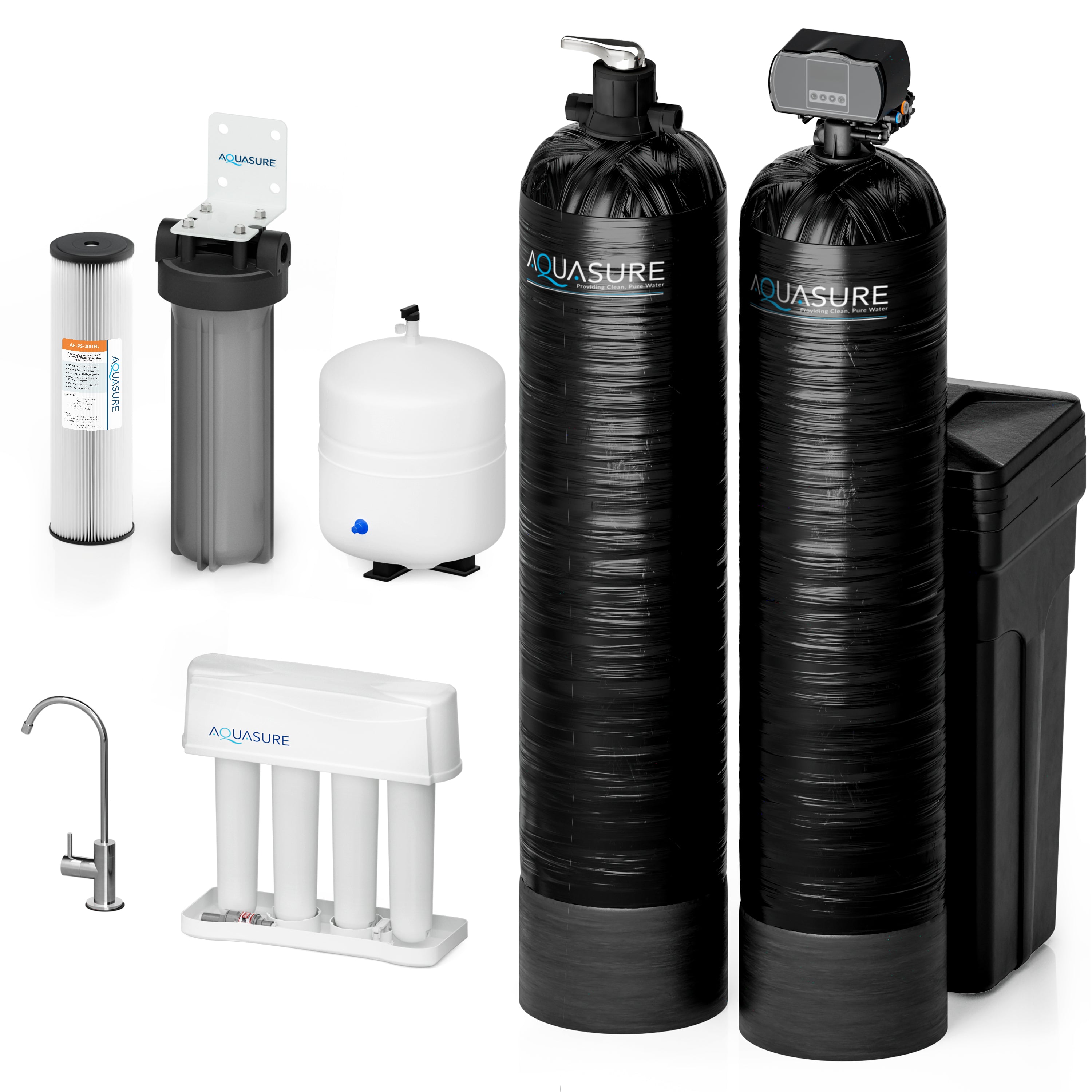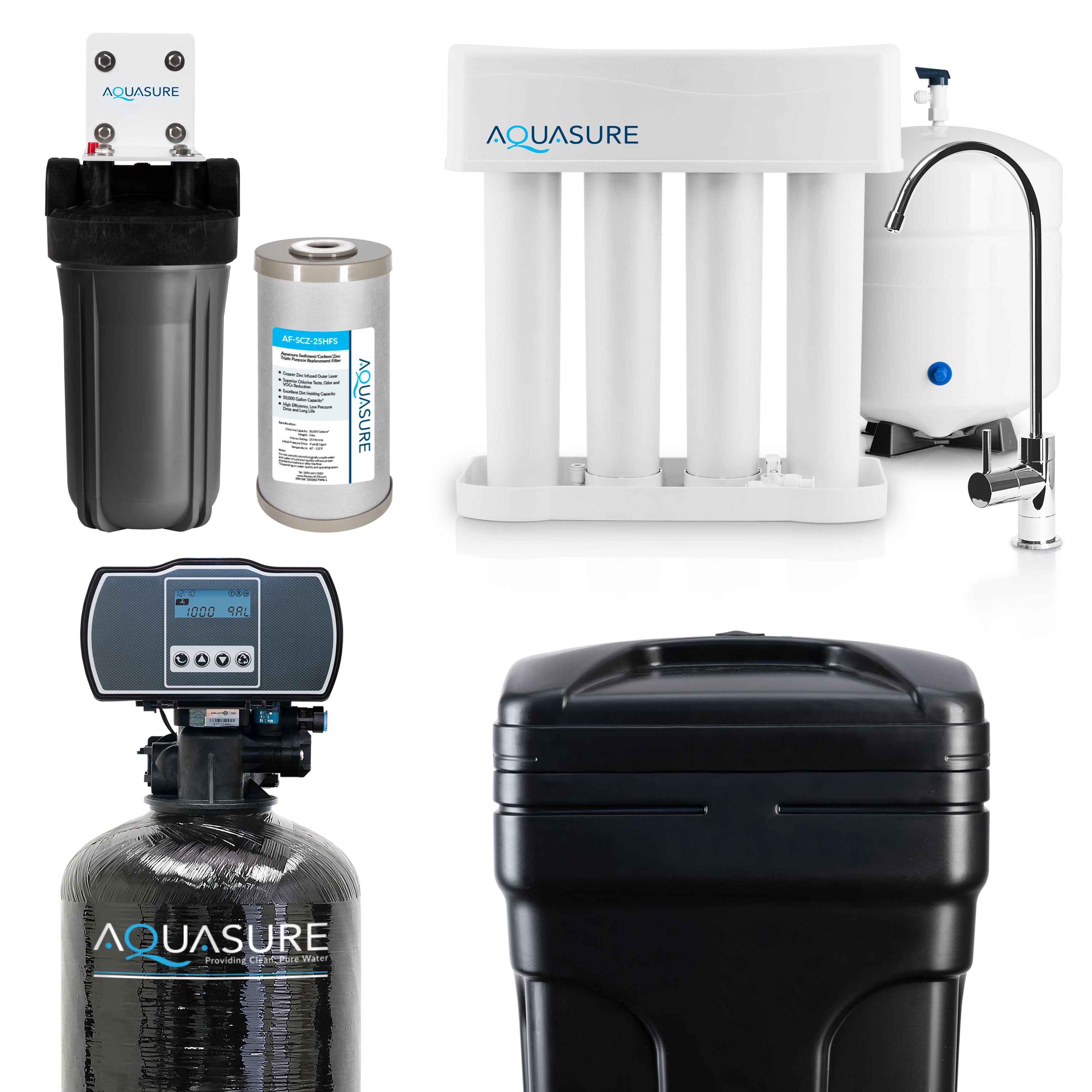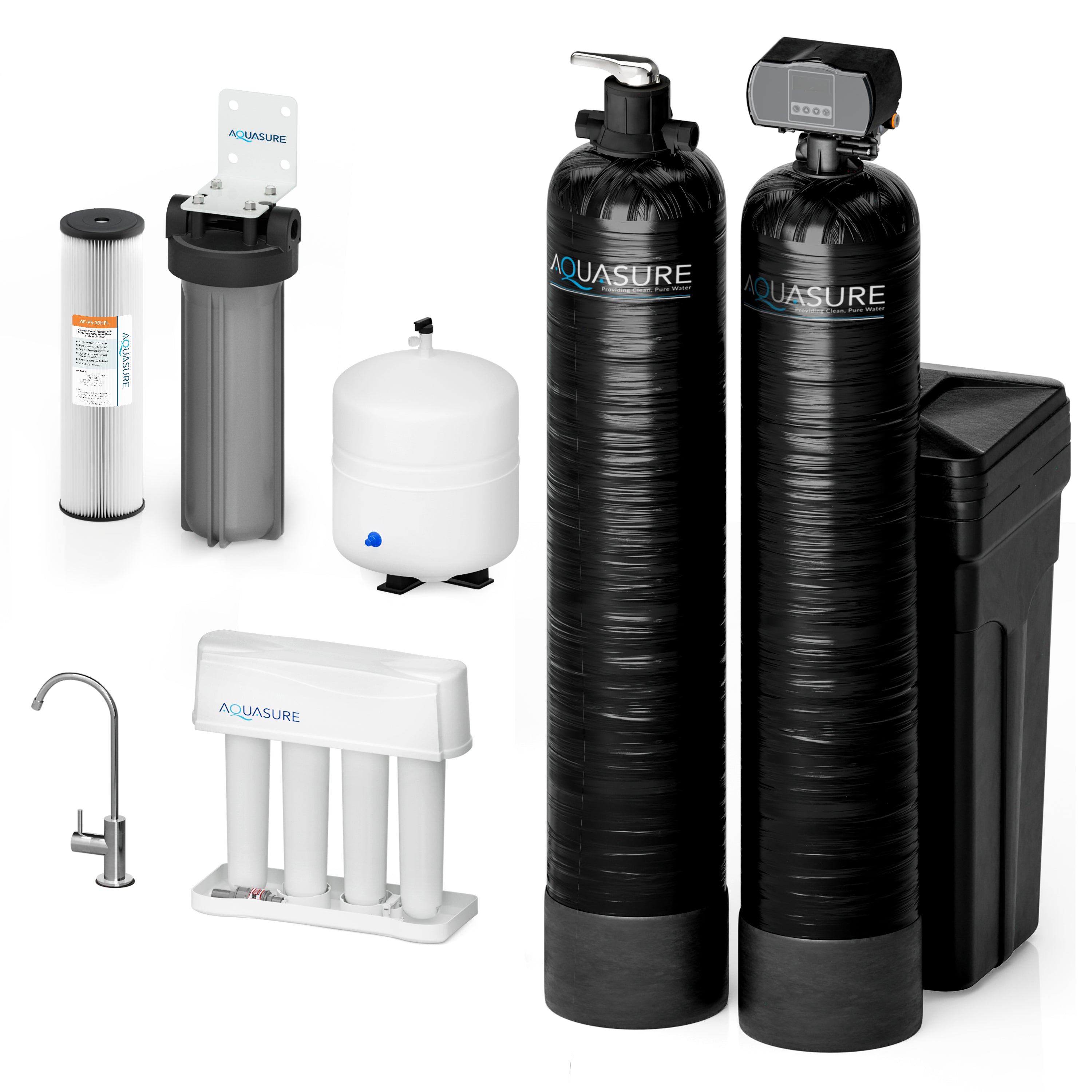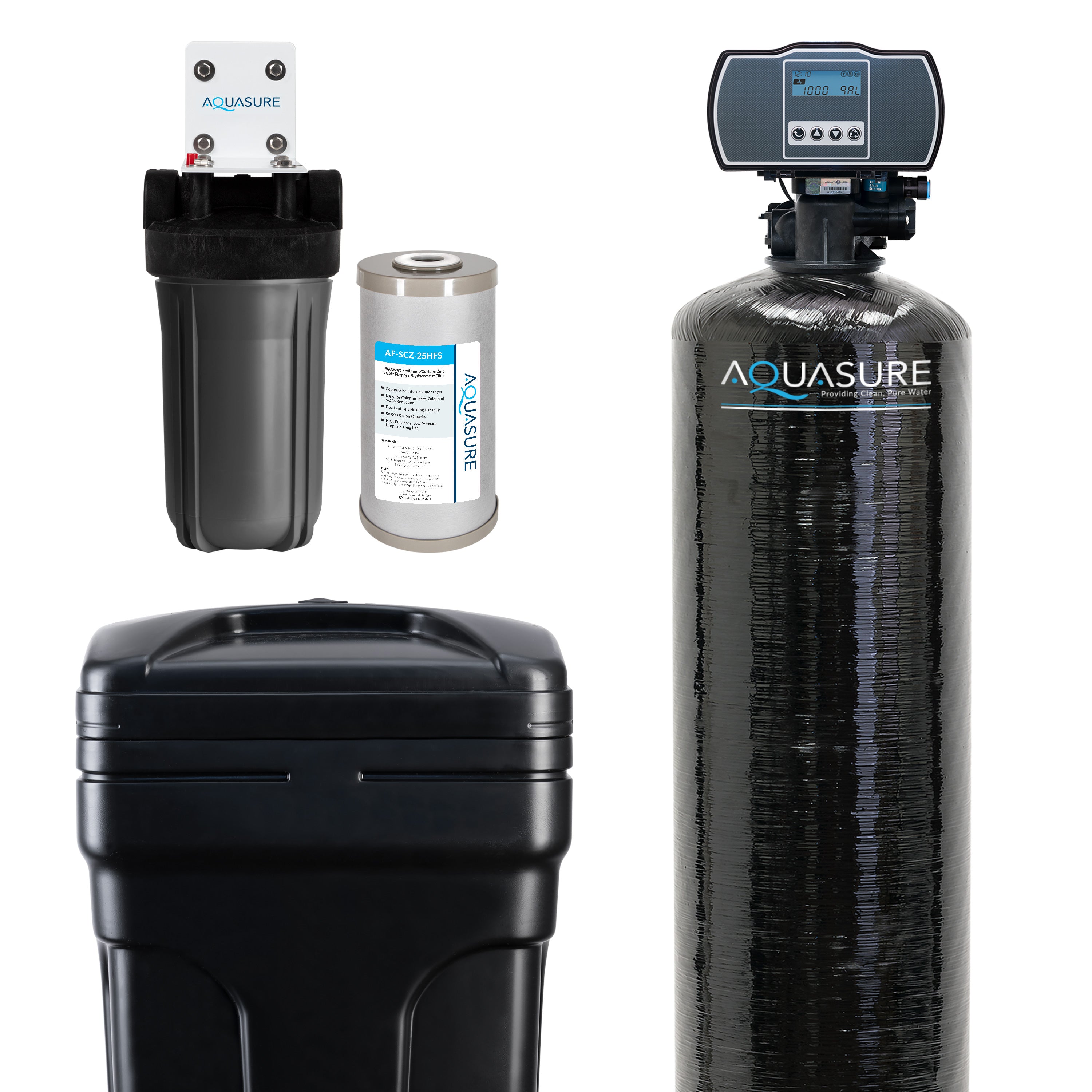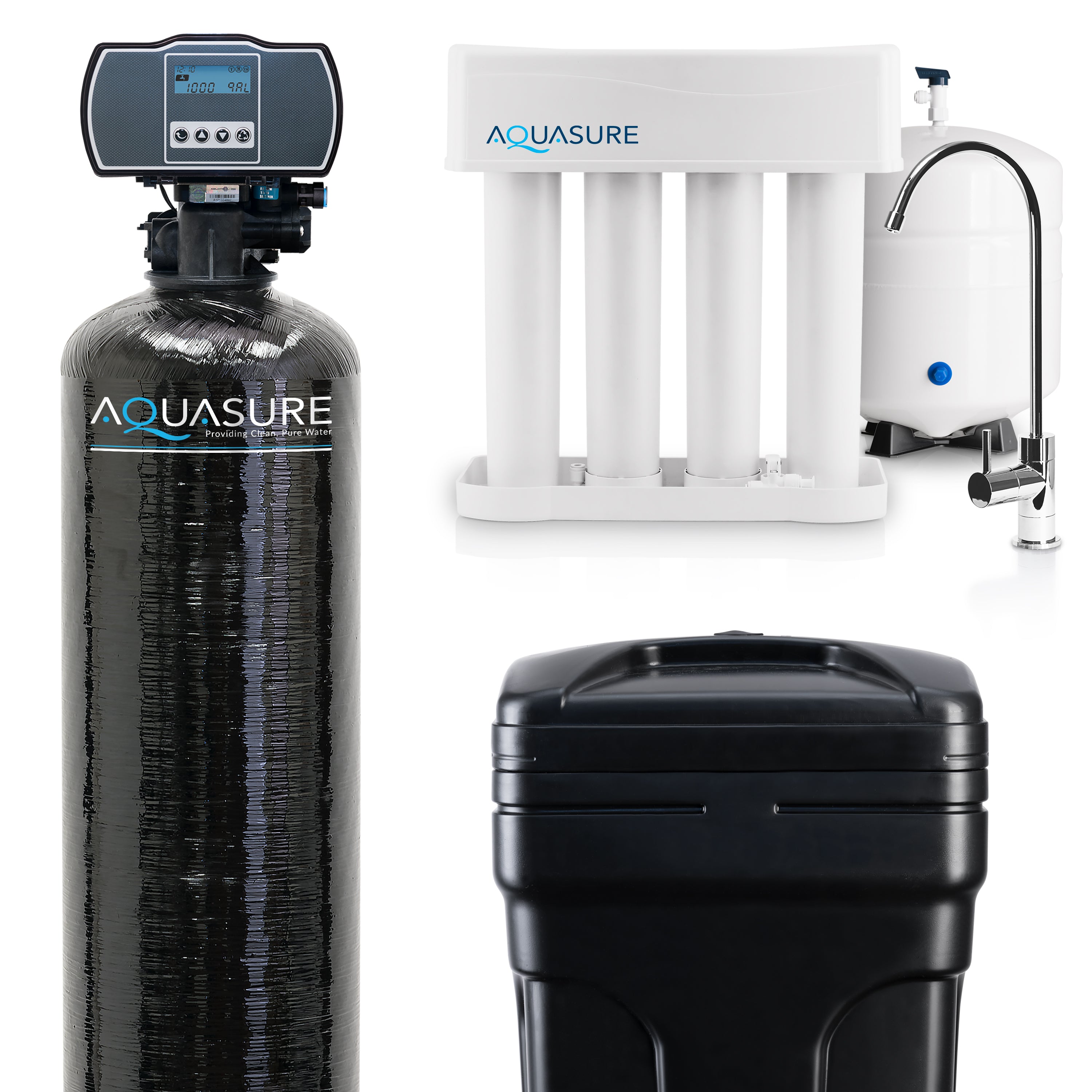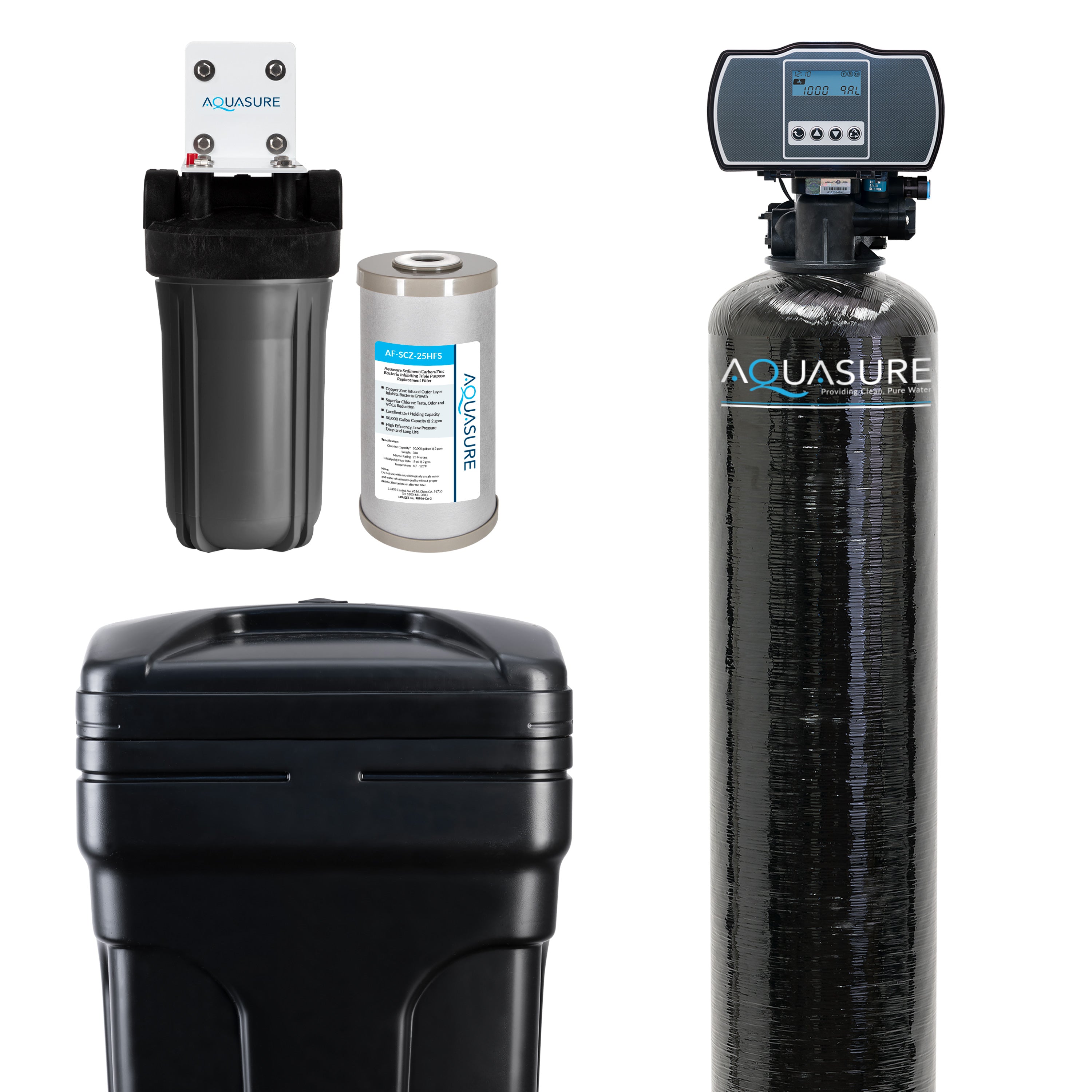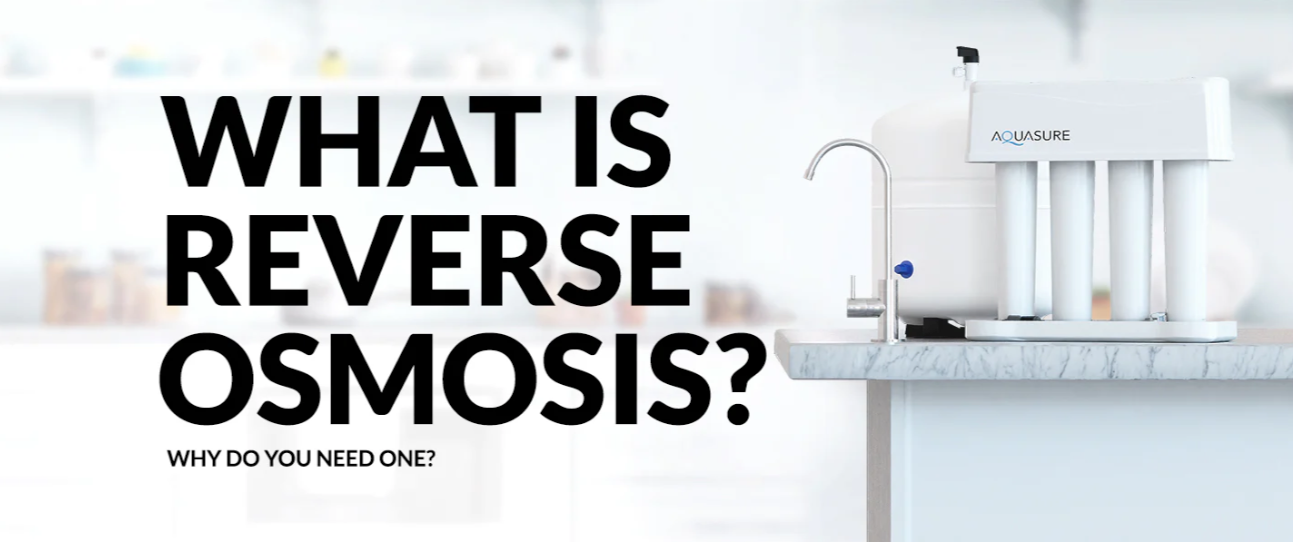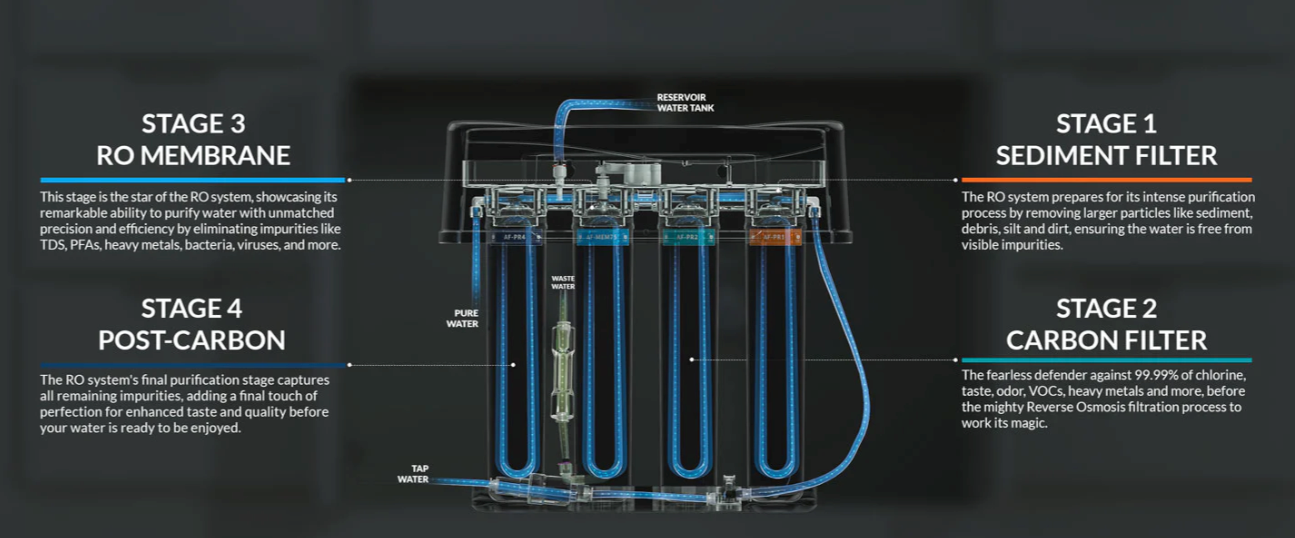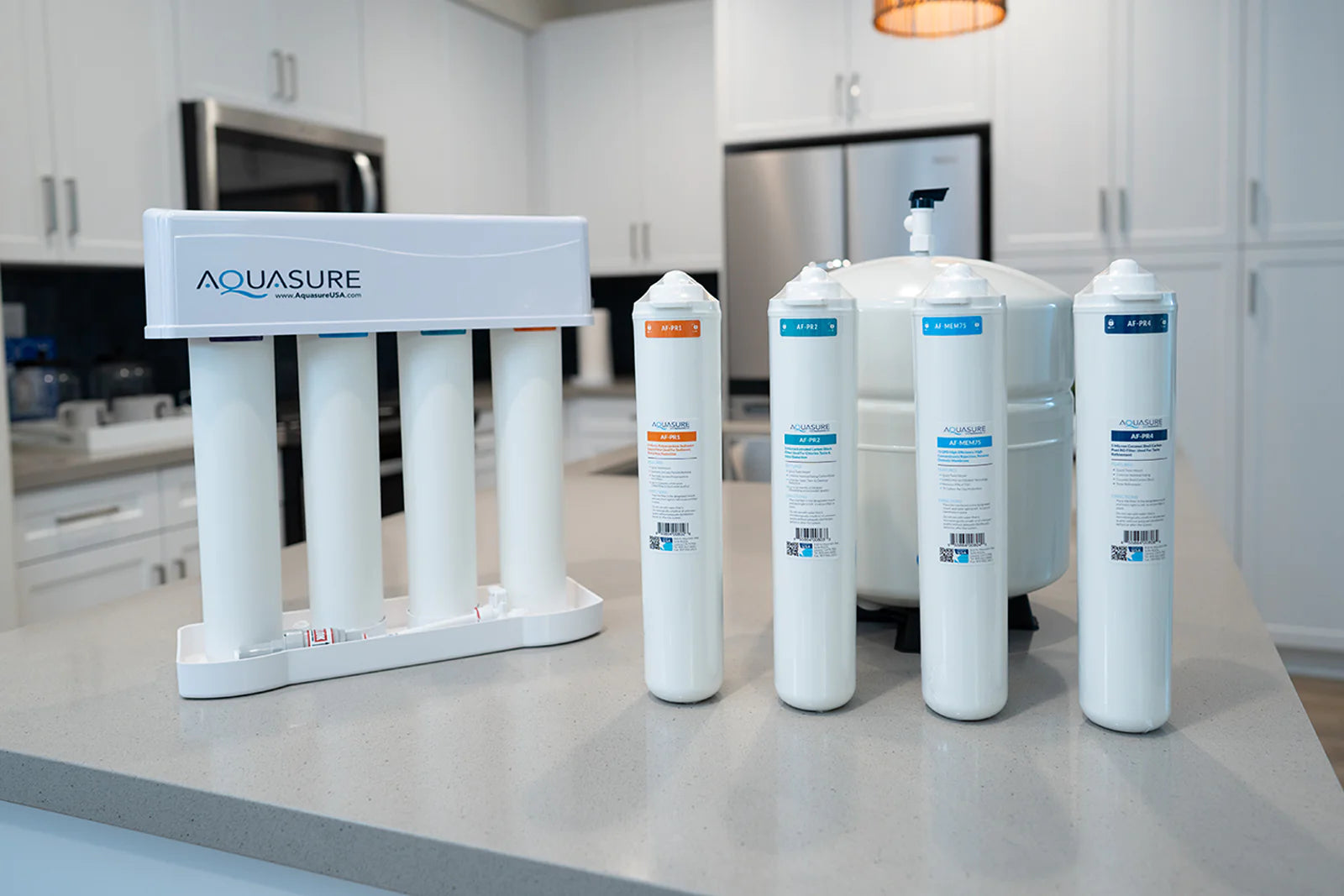-
Better Water Taste
-
Boost Immunity
-
Eliminates Contaminants
-
Easy Maintenance

What is Reverse Osmosis?
Why Do I Need One?
Our RO system features state-of-the-art water filtration technology that removes 99% of toxins including lead, fluoride, PFAs, pharmaceuticals, and more.
Filters 15x more contaminants than the leading pitcher or fridge filter, with a 98% TDS rejection rate.
Did You Know?
Nearly half of U.S. tap water contains one or more types of chemicals known as
per- and polyfluoroalkyl substances (PFAS), or Forever Chemicals.
What's in Your Water?
While tap water is generally considered safe for consumption, that doesn't mean it's perfectly pure. Here are a few contaminants that can make their way into your drinking water:
HOW IT WORKS
Advanced Molecular Filtration
Sediment, Carbon, Reverse Osmosis Membrane, and Post Carbon filters are housed in four easy-to- install cartridges that work in unison to eliminate harmful contaminants commonly found in tap water.
STAGE 1 | SEDIMENT FILTER
The RO system prepares for its intense purification process by removing larger particles like sediment. debris, silt and dirt, ensuring the water is free from visible impurities.
STAGE 2 | CARBON FILTER
The fearless defender against 99.99% of chlorine, taste, odor, VOCs, and more, before the mighty Reverse Osmosis filtration process works its magic.
STAGE 3 | RO 75 MEMBRANE
This stage is the star of the RO system, showcasing its remarkable ability to purify water with unmatched precision and efficiency by eliminating impurities like TDS, PFAs, heavy metals, and more.
STAGE 4 | POST CARBON
The RO system’s final purification stage captures all remaining impurities, adding a final touch of perfection for enhanced taste and quality before your water is ready to be enjoyed.
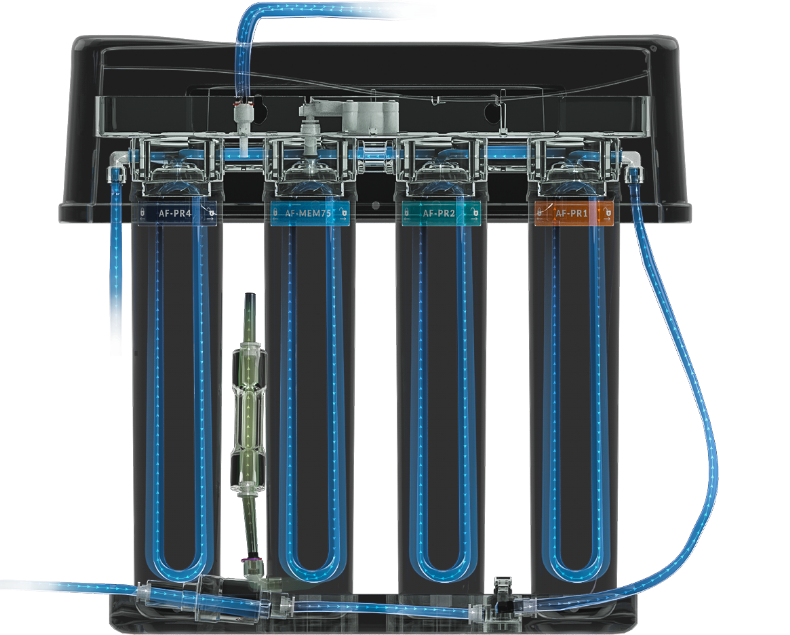
HOW IT WORKS
Advanced Molecular Filtration
Sediment, Carbon, Reverse Osmosis Membrane, and Alkaline Remineralization filters are housed in four easy-to-install cartridges that work in unison to eliminate harmful contaminants commonly found in tap water.
STAGE 1 | SEDIMENT FILTER
The RO system prepares for its intense purification process by removing larger particles like sediment. debris, silt and dirt, ensuring the water is free from visible impurities.
STAGE 2 | CARBON FILTER
The fearless defender against 99.99% of chlorine, taste, odor, VOCs, and more, before the mighty Reverse Osmosis filtration process works its magic.
STAGE 3 | RO 75 MEMBRANE
This stage is the star of the RO system, showcasing its remarkable ability to purify water with unmatched precision and efficiency by eliminating impurities like TDS, PFAs, heavy metals, bacteria, viruses, and more.
STAGE 4 | ALKALINE FILTER
In the final stage, our Alkaline filter restores the essential minerals lost during the reverse osmosis process, including calcium, magnesium, and potassium. These minerals raise pH levels for perfect alkaline water.
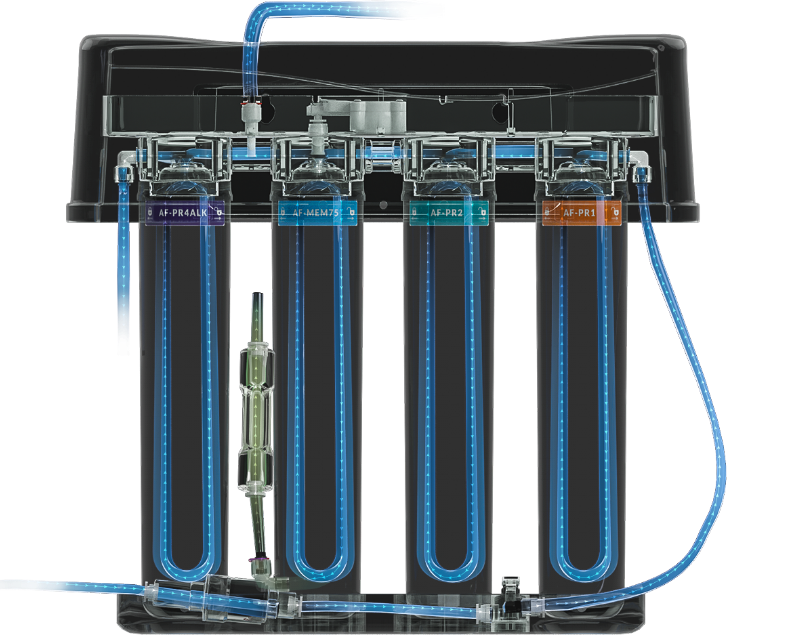
HOW IT WORKS
Advanced Molecular Filtration
Sediment, Carbon, Reverse Osmosis Membrane, and Post Carbon filters are housed in four easy-to-install cartridges that work in unison to eliminate harmful contaminants commonly found in tap water.
STAGE 1 | SEDIMENT FILTER
The RO system prepares for its intense purification process by removing larger particles like sediment. debris, silt and dirt, ensuring the water is free from visible impurities.
STAGE 2 | CARBON FILTER
The fearless defender against 99.99% of chlorine, taste, odor, VOCs, and more, before the mighty Reverse Osmosis filtration process works its magic.
STAGE 3 | RO 100 MEMBRANE
This stage is the star of the RO system, showcasing its remarkable ability to purify water with unmatched precision and efficiency by eliminating impurities like TDS, PFAs, heavy metals, bacteria, viruses, and more.
STAGE 4 | POST CARBON
The RO system’s final purification stage captures all remaining impurities. adding a final touch of perfection for enhanced taste and quality before your water is ready to be enjoved.
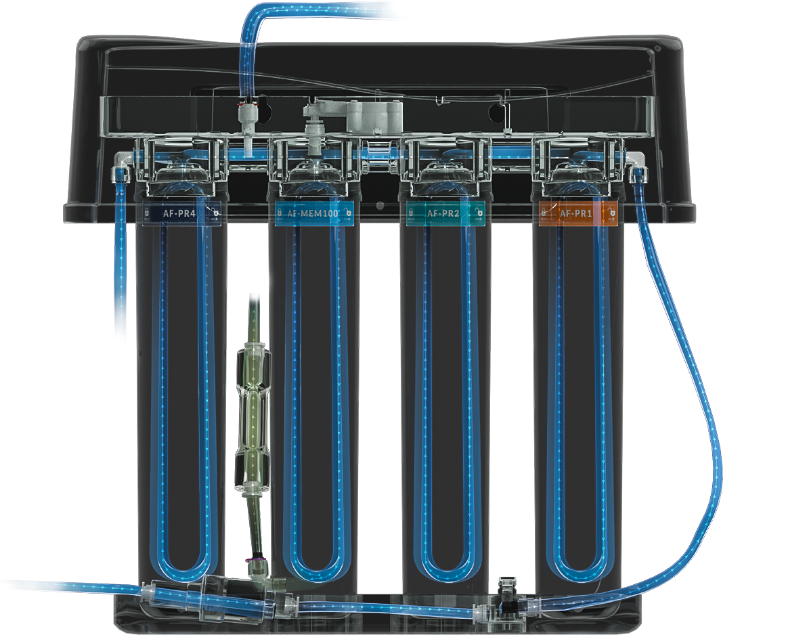
-
Contaminant Removal
(Removes 1000+ toxins)
-
Low Waste Ratio
(Better than traditional RO’s)
-
Faster Flow Rate
(Fill your glass in 6 seconds)
-
Extended Warranty
(When you register it with us)
Key Features
Compact, Space Saving Design
Installed in the cabinet under your sink, our RO’s compact, user-friendly design saves space and makes filter changes a breeze.
Easy to Install
Aquasure RO system comes pre-assembled with everything you need for your convenience.
Reverse Osmosis Technology
Removes particles and microorganisms at a high precision of 0.0001 micron. This purifies water at the molecular level, ensuring every drop is pure and free from contaminants.
How We Compare
When it comes to saving water, our RO system features a low drain ratio of 1.5:1, highly reducing waste compared to traditional RO systems with a drain ratio of 1:4.
Built-in Safety Features
Every Aquasure system is equipped with our FLOWLOK and SHOKBLOK technology to provide an extra level of security in leak prevention and system failure.
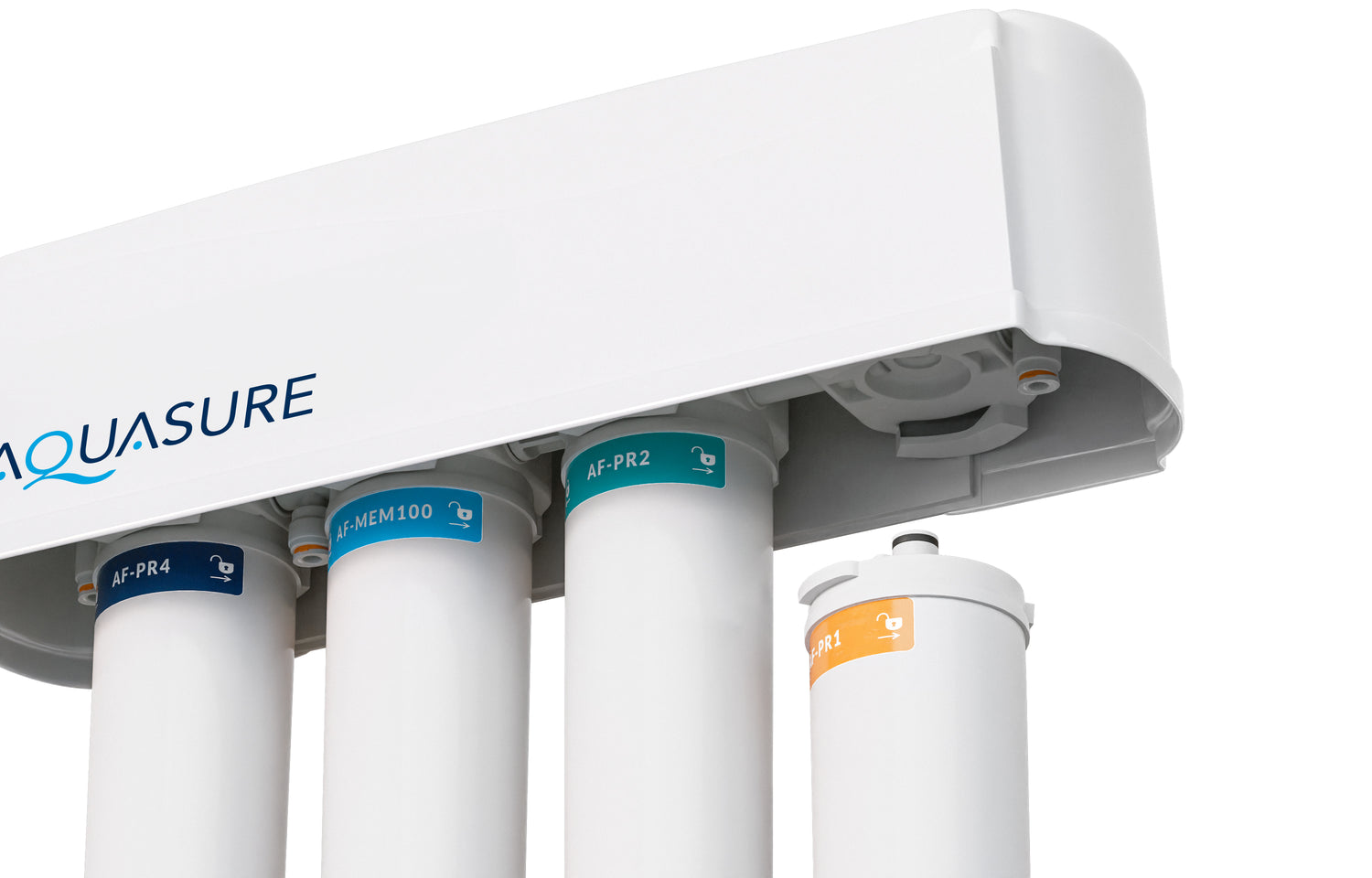
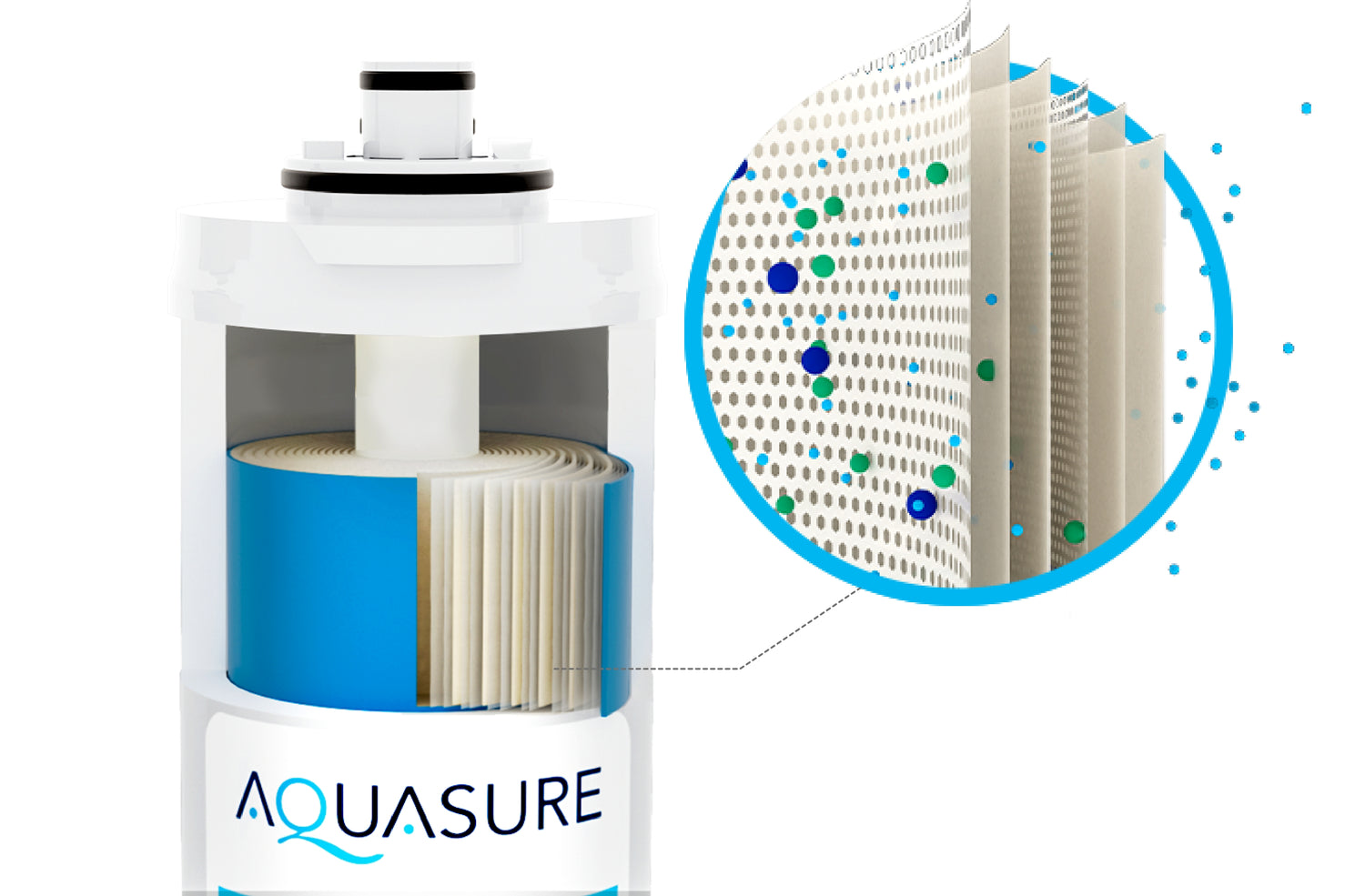
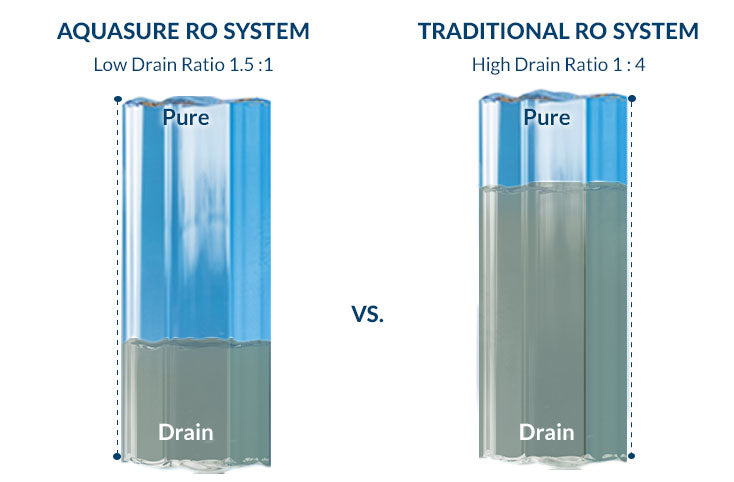
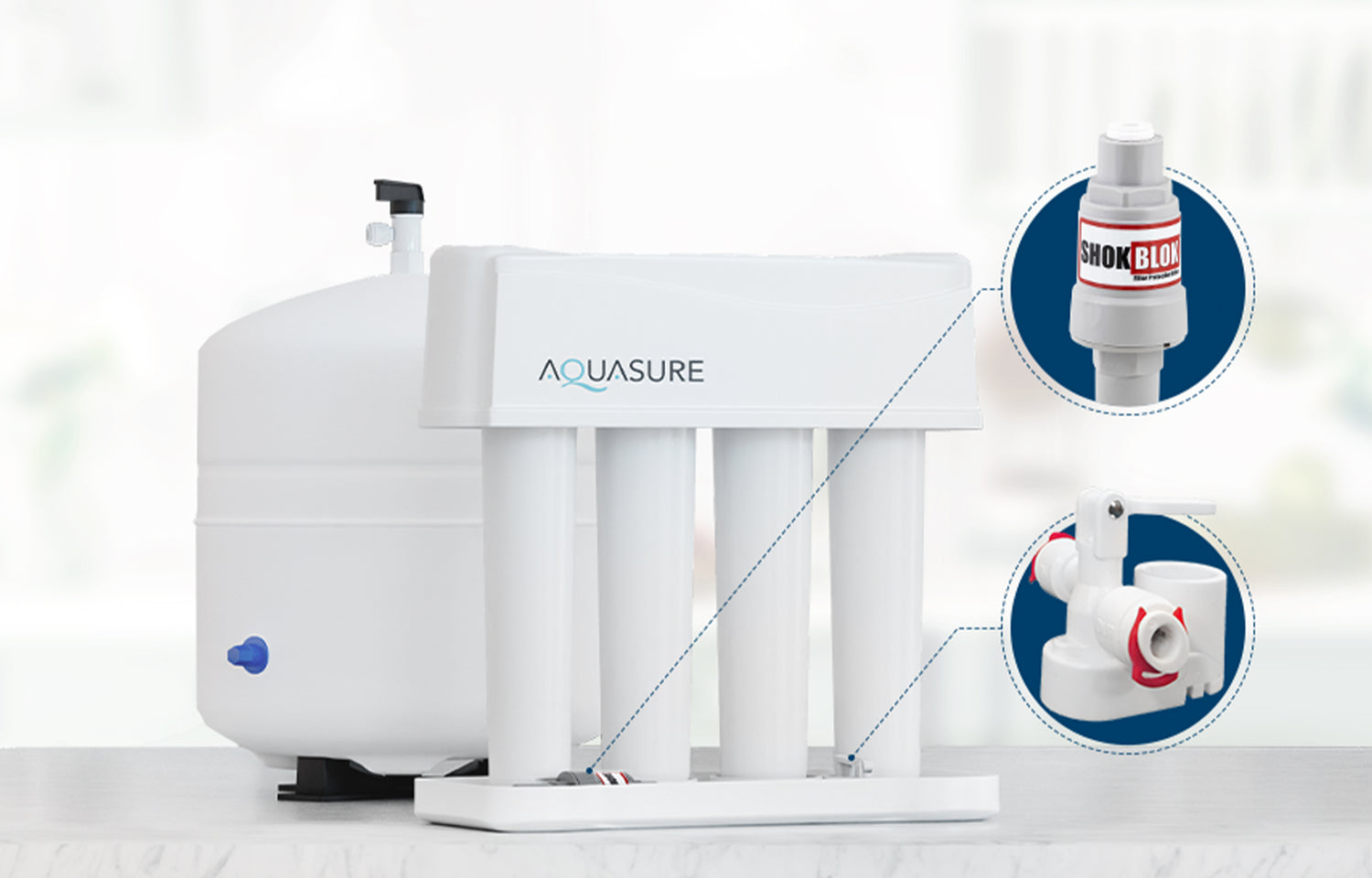
-

Superior Filtration
Unlike other types of filters, our RO can get rid of chemicals, salts, sugars, proteins, particles, heavy metals, dyes, and dissolved contaminants of all kinds. Removes 99% of toxins from your tap.
-
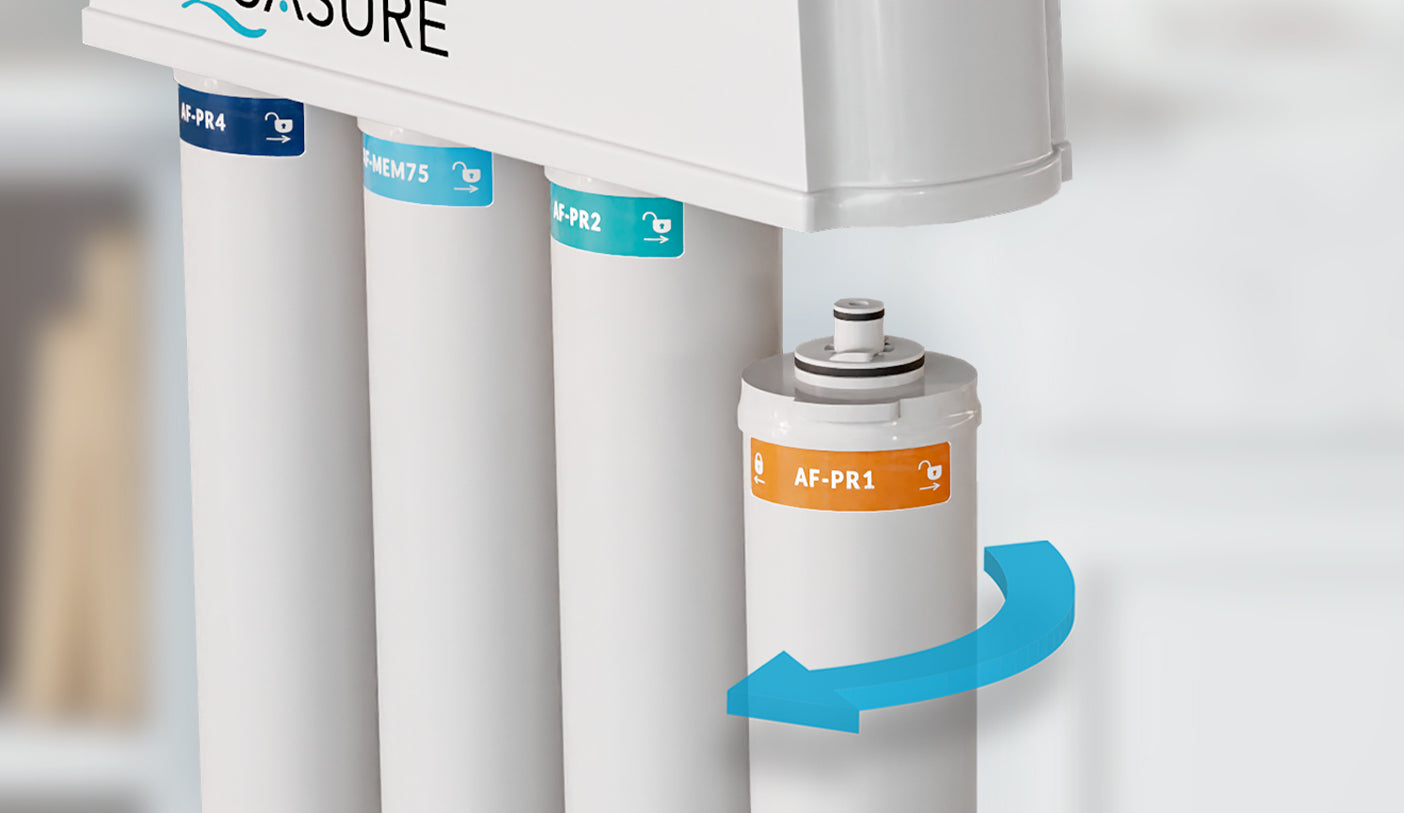
Effortless Filter Change
Brainless filter changes with our Quick-Twist design – no need to move your RO system. Simply twist and replace, keeping your water purification hassle-free and conveniently at your fingertips.
-

Better Water
Taste the difference of better water with our RO systems. From the removal of impurities to the enhancement of taste, our system delivers water at its purest form. This is how water should taste.
MAKE THE SWITCH
Reduce Plastic Waste, Save the Turtles!
Which RO System is Right For Me?
| Household Size | Any Size |
| PSI Range | 40 PSI - 75 PSI |
| Micron Rating | 0.0001 Micron |
| Electricity Required | No |
| Increase pH | No |
| Includes | Faucet |
| Household Size | Any Size |
| PSI Range | 40 PSI - 75 PSI |
| Micron Rating | 0.0001 Micron |
| Electricity Required | No |
| Increase pH | Yes |
| Includes | Faucet |
| Household Size | Any Size |
| PSI Range | 40 PSI - 75 PSI |
| Micron Rating | 0.0001 Micron |
| Electricity Required | No |
| Increase pH | No |
| Includes | LED Faucet |
| Household Size | Any Size |
| PSI Range | 20 PSI- 50 PSI |
| Micron Rating | 0.0001 Micron |
| Electricity Required | Yes |
| Increase pH | No |
| Includes | LED Faucet + Pump |
What Our Customers Are Saying
RamiI purchased this a year ago and have waited to have a good timeline in which to use it. All I can say is how very pleased we are with this softener. It was reasonably priced and has proven to be a terrific investment. The Aquasure arrived in extremely secure packaging, quickly, and safely. Once I was ready to install the unit it was easy to hook up, program, and start the first regeneration.
Jenny2 weeks since install:I had researched water softeners for some time and came across these on Amazon. Ratings for the Aquasure line were high and most of the feedback was positive.I installed the water softener myself after receiving it. So far very happy with the product and the quality of materials provided.
MarvinI live on a well water system with 44 grains of hard water per gallon. I installed this system with flex water lines to make it easier. total setup took maybe an hour. The hardest part was moving it because it was heavy. After I installed the system, It dropped my grains per gallon to less than 1. Yes, I would recommend this to a friend.
EugineWow……this is truly a great unit. Things arrived packaged well; the unpack was easy and the installation as well as programming instructions were crystal clear.
LukeGreat water softener. We bought it to replace our old one that finally quit working. This one works so much better than our old one ever did. It allows us much more water pressure and seems to use the salt more efficiently. It was also very reasonably priced. Completely satisfied.
Reverse Osmosis FAQs
Why do I need an RO system? Is my tap water safe to drink?
Yes and no but kind of. Well, it's complicated. The simple answer is yes, it is generally safe to drink U.S. tap water. Tap water in the U.S. is regulated by the EPA Safe Drinking Water Act. This legislation monitors over 90+ contaminants, ensuring their levels are within acceptable limits. However, the oversight and maintenance of water systems are managed locally by more than 50,000 utilities across the country. Primarily funded through usage rather than federal initiatives, these utilities face challenges due to aging infrastructure, with most built in the 1970s. Consequently, despite federal regulations, the overall quality of US tap water has declined, and it doesn't even rank among the top 20 countries globally for the cleanest drinking water.
So in short, while tap water undergoes regulatory monitoring and is generally within acceptable limits, it may still contain trace contaminants. An RO system provides an extra layer of purification, removing impurities like chlorine, heavy metals, pesticides, and more, ensuring your drinking water is of the highest quality and taste. It's a proactive step towards enhancing the purity and taste of your water, offering peace of mind for you and your family.
What toxins does Aquasure's RO remove? What about PFAS, Chlorine, Lead, Flouride...
Aquasure's advanced RO systems uses multi-stage reverse osmosis filtration technology to eliminate 99% of toxins in your tap including the nastiest ones like PFAS, lead, fluoride, pesticides, pharmaceuticals and nuclear particles. Simply put any contaminants that you are worried about, our RO systems can help you remove and/or reduce. Reverse osmosis is a powerful filtration method, and while all filters are not created equally, you can rest assured knowing that a high quality RO system is the most robust filtration method available for residential use.
How does RO water compare to bottled water?
For the most part... they are one and the same. Most bottled water manufacturers use reverse osmosis to filter their water - yes, RO works that well. Some companies like SmartWater will add in minerals to adjust the taste and pH, while other bottled water companies simply deliver straight RO water. If you like bottled water and you are thinking about switching to your own filtration, then RO is a perfect solution. It will give you bottled water quality water on tap, without the waste or microplastics.
How do I know I need an RO system with alkaline remineralization?
Choosing between our RO system with alkaline remineralization our RO system with post-carbon taste refinement depends on your preferences and health considerations. If you want a higher pH level in your water and the potential health benefits associated with alkaline water, our RO system with alkaline filter is a great choice. On the other hand, if you prioritize excellent taste and odor removal without altering the pH, our Premier Advanced RO system is a suitable option. Consider your personal preferences, health goals, and the specific qualities you want in your drinking water to make the best decision for your needs. Even if you initially choose our RO system with post-carbon filter, you can easily purchase the alkaline filter later if your preferences change.
Does Aquasure's RO system waste water? How does Aquasure's drain to waste ratio compare to other systems?
Kind of but not really… well, it’s complicated. The reverse osmosis process is one of the most powerful purification processes on earth. To answer the question, we need to take a step back to fully understand how the filter works. Using concentrated pressure, water is pushed through an RO (reverse osmosis) membrane: a semi-permeable, compact filter that even micro-sized heavy metals, pesticides and volatile organic compounds (VOCs) can’t slip through. All of the nasty toxins are forced one way, and pure water is forced the other way. The dirty water, filled with toxins, also referred to as grey water, is sent packing down your drain pipe. You are left with pure drinking water. So, does Aquasure's RO waste water? Technically yes, the ratio of dirty water to clean drinking water is about 1.5:1. This is also the reason we only recommend using the RO process for drinking and cooking water supplies and not whole house systems. And while the dirty water is technically “waste” we want to emphasize that grey water is unfit for human consumption.
It is also important to remember that not all RO systems are the same, and some do waste A LOT of water. A traditional RO system can waste anywhere from 4-10 gallons of water for every gallon of pure water produced. We agree this is way too much. But the technology is improving. Our RO system only wastes 1 gallon of water for every 1.5 gallon dispensed (1.5:1 ratio). The average American family uses upwards of 300 gallons of water at home per day, so installing an efficient RO system would likely account for a less than 1% increase in total water usage. We think 1% additional water usage is likely worth having pure water on tap. Cutting out 1 min from your daily shower would balance your water budget if you were to install our RO system.
Make it a bundle
The Ultimate Protection
Experience clean, healthy and safe water with this comprehensive water filtration setup, curated just for you.
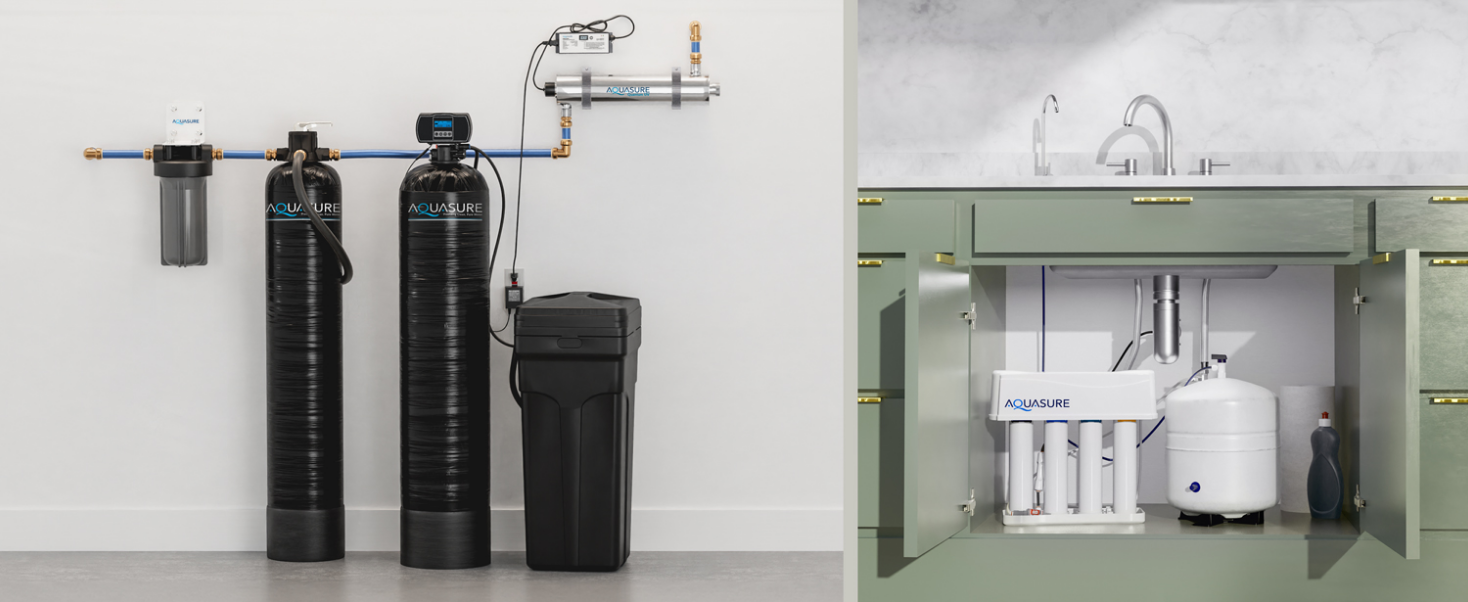
- Regular price
-
$729.99 - Regular price
-
- Sale price
-
$729.99
- Regular price
-
$899.99 $949.99 - Regular price
-
- Sale price
-
$899.99 $949.99
- Regular price
-
$499.99 - Regular price
-
- Sale price
-
$499.99
- Regular price
-
$189.99 - Regular price
-
- Sale price
-
$189.99


